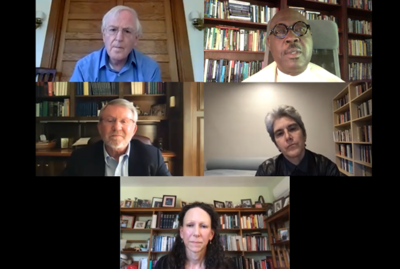
Must there be a tradeoff between economic recovery and public health during the Covid-19 pandemic? What role can ministers and chaplains play in caring for people infected by the coronavirus? What unique contributions can Christians make to a society struggling with the pandemic and the political divisions and racial disparities growing around it?
These and other ethical questions were the focus of a Yale Divinity School faculty panel discussion broadcast on May 26. Titled “Life and Death Decisions,” the event was recorded several days earlier on Zoom.
***
‘Life and Death Decisions’: Watch the video
***
YDS Dean Greg Sterling served as moderator, posing his own questions as well as several pre-submitted by audience members. Serving on the panel were:
• John Hare, Noah Porter Professor of Philosophical Theology
• Jennifer Herdt, Gilbert L. Stark Professor of Christian Ethics, Senior Associate Dean for Academic Affairs
• Willie Jennings, Associate Professor of Systematic Theology and Africana Studies
• Kathryn Tanner, Frederick Marquand Professor of Systematic Theology
Tanner, author most recently of the 2019 book Christianity and the New Spirit of Capitalism, rejected the contention that public health must be sacrificed for the sake of a faster economic recovery.
“Before we start weighing up risks, we need to ask bigger questions,” Tanner said. “How might things be fundamentally changed to avoid such tradeoffs? Raising these structural questions is necessary if we are to act toward one another in the way God acts toward us as our creator and redeemer. God doesn’t intend our lives to be organized as zero-sum games, and we need to do whatever we can to avoid them.”
Jennings, author of the multiple-award-winning book The Christian Imagination among other works, closed the event with a call to Christians and all religious people to use their creativity and unique perspective to mount a shared public witness, with the aim of transforming this fearful moment into catalyst for positive change that emphasizes human wellbeing.
“Those of us who are religious,” Jennings said, “can collectively say to the world we will not go back to the way things were. We can say this is a time to pause and to think a new future.”